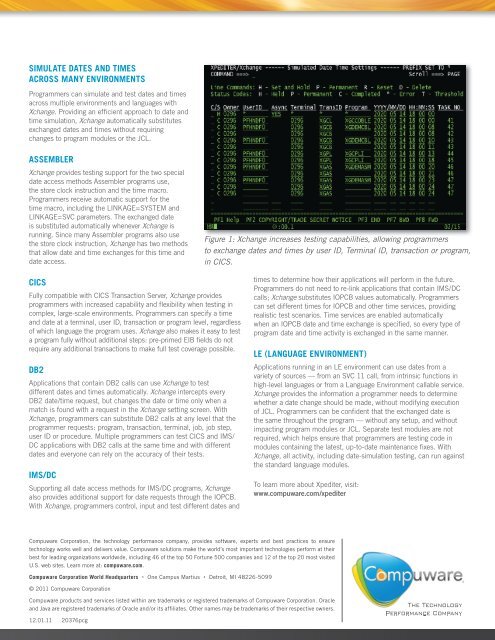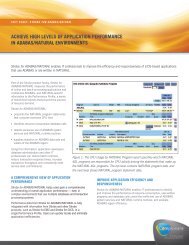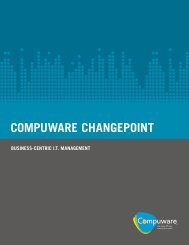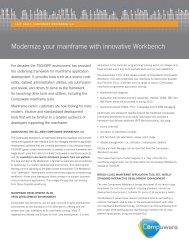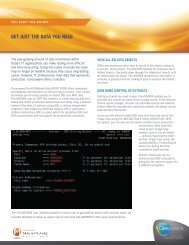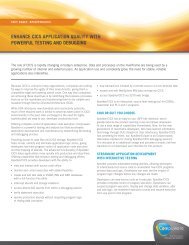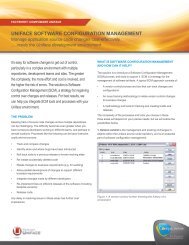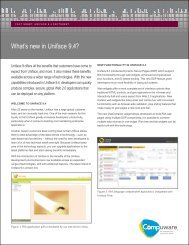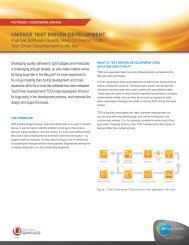IDENTIFY, SIMULATE AND TEST DATE - Compuware Corporation
IDENTIFY, SIMULATE AND TEST DATE - Compuware Corporation
IDENTIFY, SIMULATE AND TEST DATE - Compuware Corporation
Create successful ePaper yourself
Turn your PDF publications into a flip-book with our unique Google optimized e-Paper software.
<strong>SIMULATE</strong> <strong>DATE</strong>S <strong>AND</strong> TIMES<br />
ACROSS MANY ENVIRONMENTS<br />
Programmers can simulate and test dates and times<br />
across multiple environments and languages with<br />
Xchange. Providing an effi cient approach to date and<br />
time simulation, Xchange automatically substitutes<br />
exchanged dates and times without requiring<br />
changes to program modules or the JCL.<br />
ASSEMBLER<br />
Xchange provides testing support for the two special<br />
date access methods Assembler programs use,<br />
the store clock instruction and the time macro.<br />
Programmers receive automatic support for the<br />
time macro, including the LINKAGE=SYSTEM and<br />
LINKAGE=SVC parameters. The exchanged date<br />
is substituted automatically whenever Xchange is<br />
running. Since many Assembler programs also use<br />
the store clock instruction, Xchange has two methods<br />
that allow date and time exchanges for this time and<br />
date access.<br />
CICS<br />
Fully compatible with CICS Transaction Server, Xchange provides<br />
programmers with increased capability and fl exibility when testing in<br />
complex, large-scale environments. Programmers can specify a time<br />
and date at a terminal, user ID, transaction or program level, regardless<br />
of which language the program uses. Xchange also makes it easy to test<br />
a program fully without additional steps: pre-primed EIB fi elds do not<br />
require any additional transactions to make full test coverage possible.<br />
DB2<br />
Applications that contain DB2 calls can use Xchange to test<br />
different dates and times automatically. Xchange intercepts every<br />
DB2 date/time request, but changes the date or time only when a<br />
match is found with a request in the Xchange setting screen. With<br />
Xchange, programmers can substitute DB2 calls at any level that the<br />
programmer requests: program, transaction, terminal, job, job step,<br />
user ID or procedure. Multiple programmers can test CICS and IMS/<br />
DC applications with DB2 calls at the same time and with different<br />
dates and everyone can rely on the accuracy of their tests.<br />
IMS/DC<br />
Supporting all date access methods for IMS/DC programs, Xchange<br />
also provides additional support for date requests through the IOPCB.<br />
With Xchange, programmers control, input and test different dates and<br />
<strong>Compuware</strong> <strong>Corporation</strong>, the technology performance company, provides software, experts and best practices to ensure<br />
technology works well and delivers value. <strong>Compuware</strong> solutions make the world’s most important technologies perform at their<br />
best for leading organizations worldwide, including 46 of the top 50 Fortune 500 companies and 12 of the top 20 most visited<br />
U.S. web sites. Learn more at: compuware.com.<br />
<strong>Compuware</strong> <strong>Corporation</strong> World Headquarters • One Campus Martius • Detroit, MI 48226-5099<br />
© 2011 <strong>Compuware</strong> <strong>Corporation</strong><br />
<strong>Compuware</strong> products and services listed within are trademarks or registered trademarks of <strong>Compuware</strong> <strong>Corporation</strong>. Oracle<br />
and Java are registered trademarks of Oracle and/or its affi liates. Other names may be trademarks of their respective owners.<br />
12.01.11 20376pcg<br />
Figure 1: Xchange increases testing capabilities, allowing programmers<br />
to exchange dates and times by user ID, Terminal ID, transaction or program,<br />
in CICS.<br />
times to determine how their applications will perform in the future.<br />
Programmers do not need to re-link applications that contain IMS/DC<br />
calls; Xchange substitutes IOPCB values automatically. Programmers<br />
can set different times for IOPCB and other time services, providing<br />
realistic test scenarios. Time services are enabled automatically<br />
when an IOPCB date and time exchange is specifi ed, so every type of<br />
program date and time activity is exchanged in the same manner.<br />
LE (LANGUAGE ENVIRONMENT)<br />
Applications running in an LE environment can use dates from a<br />
variety of sources — from an SVC 11 call, from intrinsic functions in<br />
high-level languages or from a Language Environment callable service.<br />
Xchange provides the information a programmer needs to determine<br />
whether a date change should be made, without modifying execution<br />
of JCL. Programmers can be confi dent that the exchanged date is<br />
the same throughout the program — without any setup, and without<br />
impacting program modules or JCL. Separate test modules are not<br />
required, which helps ensure that programmers are testing code in<br />
modules containing the latest, up-to-date maintenance fi xes. With<br />
Xchange, all activity, including date-simulation testing, can run against<br />
the standard language modules.<br />
To learn more about Xpediter, visit:<br />
www.compuware.com/xpediter


